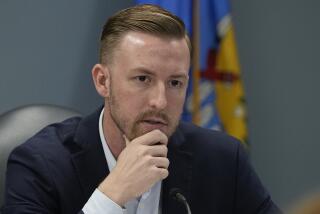Victor in Alabama Prayer Case Resented and Isolated
- Share via
MOBILE, Ala. — Ishmael Jaffree said Tuesday that he paid a steep price for victory in his battle against prayer in public schools, including isolation within the black community and resentment from his own children.
“Had I known what I was going to go through, I would not have filed the case solely because of the effects on my children,” Jaffree said after the U.S. Supreme Court threw out an Alabama law that allowed periods for “meditation or voluntary prayer” in public schools.
“In the black community, I’m sort of looked down upon,” said the 41-year-old Mobile attorney, an avowed agnostic.
‘I’ve Lost Credibility’
He said his peers in the black community disapproved of his challenging the law. “That’s the lasting effect. I’ve lost credibility in the black community. Ours is a very religious people.”
In the months after he filed the case in 1981, Jaffree said he considered moving away from Mobile. “Eggs were thrown at my car in my neighborhood,” he said.
Jaffree said he filed the lawsuit on behalf of his five children, saying they had suffered emotionally for refusing to pray in the classroom and join in grace before meals.
But as publicity about the lawsuit grew, he said, his children became his critics. He said the children were “swept into the case” as the interest of politicians and the news media grew.
“They resent the fact that I brought the case. They received criticism at school,” he said. “My own children call it a ‘stupid case.’ That’s what they’ve heard in class.”
Wife Remained in Backround
His wife, Mozelle, remained in the background, he said, “avoiding the media at all costs.”
The children--Jamael Aakki, 12; Makeba Green, 11; Chioke Saleem Jaffree, 9; Naileh Jaffree, 7, and Talibah, 7--still attend Mobile public schools.
Jaffree said Tuesday’s decision was a “giant step” by the high court in saying “that in matters of religion on public schools, public officials are not authorized to tread.”
But he said the decision would “stir up to no end the religious right.”
More to Read
Sign up for Essential California
The most important California stories and recommendations in your inbox every morning.
You may occasionally receive promotional content from the Los Angeles Times.













